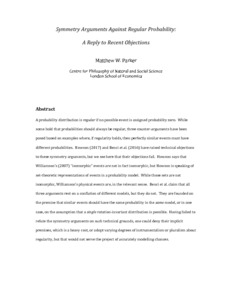Parker, Matthew W.
(2018)
Symmetry arguments against regular probability: A reply to recent objections.
[Preprint]
This is the latest version of this item.
![[img]](https://philsci-archive.pitt.edu/14960/7.hassmallThumbnailVersion/Symmetry%20Arguments%20against%20Regular%20Probability%20revised.pdf)  Preview |
|
Text
Symmetry Arguments against Regular Probability revised.pdf
- Accepted Version
Download (371kB)
| Preview
|
Abstract
A probability distribution is regular if no possible event is assigned probability zero. While some hold that probabilities should always be regular, three counter-arguments have been posed based on examples where, if regularity holds, then perfectly similar events must have different probabilities. Howson (2017) and Benci et al. (2016) have raised technical objections to these symmetry arguments, but we see here that their objections fail. Howson says that Williamson’s (2007) “isomorphic” events are not in fact isomorphic, but Howson is speaking of set-theoretic representations of events in a probability model. While those sets are not isomorphic, Williamson’s physical events are, in the relevant sense. Benci et al. claim that all three arguments rest on a conflation of different models, but they do not. They are founded on the premise that similar events should have the same probability in the same model, or in one case, on the assumption that a single rotation-invariant distribution is possible. Having failed to refute the symmetry arguments on such technical grounds, one could deny their implicit premises, which is a heavy cost, or adopt varying degrees of instrumentalism or pluralism about regularity, but that would not serve the project of accurately modelling chances.
Available Versions of this Item
Monthly Views for the past 3 years
Monthly Downloads for the past 3 years
Plum Analytics
Actions (login required)
 |
View Item |



